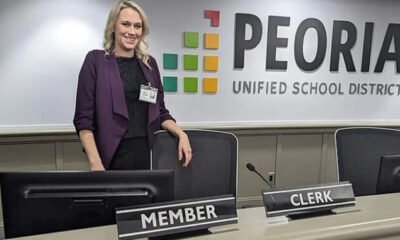Entertainment
Agencies Facing 2025 Deadline Anticipate Stringent New Regulations

State agencies in Arizona slated for sunset reviews are gearing up for a challenging legislative session in 2025. Among those facing potential dissolution are the Department of Housing, the Department of Insurance and Financial Institutions, the Governor’s Regulatory Review Council, and the Board of Executive Clemency.
The sunset review process enables lawmakers to evaluate agency effectiveness over time. When agencies’ operational periods come to an end, the Auditor General’s Office examines them and presents findings along with recommendations.
Following the audit, legislative committees convene to discuss the reports, allowing the Auditor General and agency officials to testify. The committees then vote on whether to continue, modify, consolidate, or terminate the agency in question.
While agencies typically receive continuations of up to 10 years, recent discussions have raised questions about the adequacy of that timeframe for oversight. With certain agencies expected to face shorter continuation periods, the audit findings may significantly influence outcomes.
A recent audit revealed a serious lapse at the Housing Department, where $2 million was mistakenly disbursed to individuals posing as representatives of a title company and a nonprofit organization. This incident underscores the need for stricter oversight.
Sen. Jake Hoffman, R-Queen Creek, has emerged as a leading advocate for tighter regulation of state agencies since his election in 2022. He expressed intentions to pursue two-year continuations for agencies in 2025, reiterating his stance on ensuring governmental accountability.
“A responsible government is an accountable government,” Hoffman stated. “There is no reasonable justification for granting lengthy continuations to agencies that often operate ineffectively.”
Hoffman, who chairs the Senate Government Committee, anticipates that all agencies under his committee’s review in 2024 will receive recommendations for two-year continuations. This proposal faces opposition from Democrats, who argue that frequent audits could overburden both agencies and the Auditor General’s Office.
Will Humble, former director of the Department of Health Services, linked the current contention over continuation periods to the dynamics of divided government, noting that heightened scrutiny has emerged since Republicans lost unified control. He supports greater audit frequency but acknowledges the need for additional resources to the Auditor General’s Office.
The Governor’s Regulatory Review Council is also expected to navigate a tumultuous continuation process. Earlier this year, Republicans attempted to increase oversight of the council, proposing Proposition 315, which voters ultimately rejected.
Although the Auditor General identified only minor issues in its review of the council, Republican criticisms of rules enacted under the Hobbs administration may complicate the council’s future.
Other agencies under review include the Board of Osteopathic Examiners, the Board of Respiratory Care Examiners, the Board of Behavioral Health Examiners, and the School Facilities Oversight Board. Most agencies in the review process made minimal changes in response to audits.
However, Hoffman hinted that even well-performing agencies might face challenges in 2025. He cited a desire for the Arizona Legislature to adopt efficiency measures reminiscent of those advocated by President-Elect Donald Trump.
“We must ensure government operates efficiently, cutting waste and enhancing accountability,” he remarked. “The promise to the citizens of Arizona is clear: reduction of non-essential functions and rigorous scrutiny of expenditures.”


















